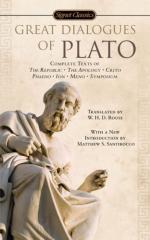|
This section contains 706 words (approx. 2 pages at 400 words per page) |

|
Republic: Book VIII Summary
Socrates now returns to the subject of the four disordered forms of government, which correspond to four disordered states of a soul. They are timocracy, oligarchy, democracy, and tyranny. Starting with the ideal state—which is called aristocracy, or rule by the best—timocracy (rule by the spirited or honorable) develops when the military class becomes mingled with the ruling class. A martial government forms and the state loses its direction from philosophy, but retains many of the virtues of the soldiers; property is still held in common and education proceeds in a similar, but not identical, fashion. This corresponds to the kind of man who lives not by reason, but by honor and passion, which, while imperfect, do not lead him to act altogether unvirtuously.
Oligarchy, rule by the rich, develops when the disorder inherent in...
(read more from the Republic: Book VIII Summary)
|
This section contains 706 words (approx. 2 pages at 400 words per page) |

|




